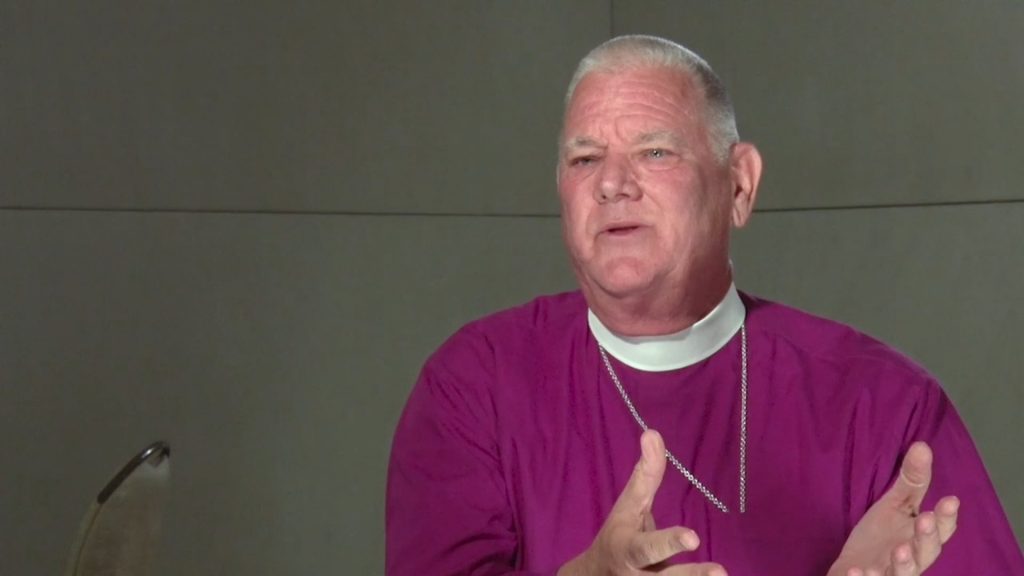Updated to include a statement from the author of the defeated resolution.
Church Times reports that the Anglican Consultative Council near its close of business rejected a resolution favored by the Archbishop of Canterbury. Oklahoma Bishop Ed Konieczny objected to the resolution. He said it had “hidden within it, [something] which sets us up to create some other body, or somebody, to adjudicate who’s in and who’s out of the Anglican Communion.”
From Church Times:
Archbishop defeated. The averting of the crisis over the Episcopal Church’s resolution was not the end of the afternoon’s business. Another resolution, proposed by Dr Atherstone, lamented “the strained and broken relationships” in the Communion, and requested that the Archbishop of Canterbury consider setting up a theological task group to “clarify the core identity and boundaries” of the Communion.
Archbishop Welby welcomed the resolution; but after Bishop Konieczny objected that the resolution had, “hidden within it, [something] which sets us up to create some other body, or somebody, to adjudicate who’s in and who’s out of the Anglican Communion”.
The resolution was judged to have been accepted by general, verbal consent, but Bishop Konieczny, supported by more than one third of the members, asked for a counted vote, and it was found to have been defeated by 43 votes to 35, with 8 abstentions.
Update 5/9/2019. Arthur Atherstone, a member of ACC from the Church of England, has posted a lengthy discourse What really happened at the Anglican Consultative Council (ACC 17)?
For context, consider that during ACC-17 he declined eucharistic fellowship:
We are facing a situation in which a growing group of progressive provinces is increasingly marked out from the rest of the Anglican Communion, and some form of clearer differentiation between us is needed or the Communion will implode.
One visible form of differentiation is to decline eucharistic fellowship. This was my approach to ACC-17.
He includes the text of his resolution:
The Anglican Consultative Council, as one of the four Instruments of Communion:
-
- recognises our particular responsibility to promote the unity of the Anglican Communion
- laments the strained and broken relationships between us, as evidenced by the absence of representatives from Nigeria, Rwanda, and Uganda at ACC-17
- acknowledges that these broken relationships are often the result of serious theological disagreements
- requests the Archbishop of Canterbury to consider establishing a theological task group to clarify the core identity and boundaries of the Anglican Communion in the 21st century.
Atherton goes on to say his defeated resolution concerned whether ACNA is in or out of the Anglican Communion:
So here’s the ecclesiological question: is ACNA part of the Anglican Communion or not? And if not, what steps do they need to take to join the Anglican Communion? Who is going to take up the challenge to answer the ‘significant questions of polity and jurisdiction’ to which the primates allude? It will not do simply to tell ACNA (or any other province created under similar circumstances) that they are free to apply for permission to enter the Anglican Communion, and that we will begin to consider the case when they do so. On the contrary, the Anglican Communion must first take responsibility for investigating these questions, in a serious and rigorous manner, before any progress can be made. That is why my defeated ACC resolution appealed for clarity on ‘the core identity and boundaries of the Anglican Communion in the 21st century’. Which side of the boundary do ACNA fall? If currently outside, then how do they transfer across the boundary? We need an answer!
Second, can separate Anglican jurisdictions intermingle or overlap in the same geographical area? … It must be possible to draw up sensible, practical, negotiated guidelines for how two provinces occupy the same space. But what would this look like? We need an answer!

